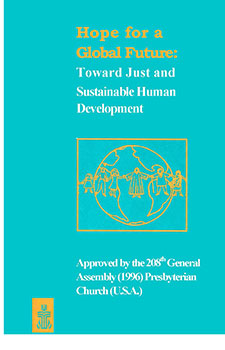
Just and sustainable human development is the comprehensive enhancement of the quality of life for all, present and future; it necessarily involves the integration of economic, social, political, cultural, ecological, and spiritual dimensions of being. With this definition of “just and sustainable human development,” this policy statement addresses international issues in the economic structure. It is based on a biblical theology and Christian assumption of the mutual responsibility and equality of human beings in God’s sight, stating that equitable distribution of goods and ecological constraints put moral limits on economic activity for the sake of human well-being, future generations, and nonhuman life. It calls for a renewed emphasis on the Reformed norm of frugality and lifts up the norm of sufficiency so that all may participate in the “good life,” calling for abundant living in caring communities in a way that is less materialistic and more frugal.